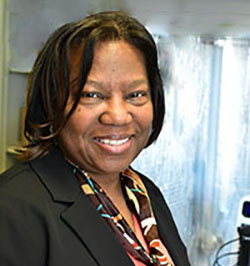
Dr. Valerie Goss
Associate Professor of Chemistry
| Contact Information |
| Phone: (773) 995-3892 |
| Email: vgoss@csu.edu |
| Office: WSC-234 |
|
| Education |
| B.S., Chicago State University |
| M.S., Loyola University of Chicago |
| M.S., Universtiy of Ntre Dame |
| Ph.D., University of Notre Dame |
|
Hobbies & Interests
Reading, flying kites, dancing
Research Interests
Our group is interested in surface chemistry. Higher ordered structures on surfaces
which can be modified to build functional circuits or sensors is the driving science
behind our research. One of the major nanostructures that we use is DNA origami.
Our work is applicable to molecular electronics and biomolecule sensing. We are
also interested in nanomolecules binding onto meteorite surfaces, and the antimicrobial
properties of metallic nanoparticles.
Representative Presentations & Publications
- Bidhar, S., Goss, V., Chen, W. Y., Stanishevsky, A., Li, M., Kuksenko, S., ... & Zwaska,
R. (2021). Production and qualification of an electrospun ceramic nanofiber material
as a candidate future high power target. Physical Review Accelerators and Beams, 24(12),
123001.
Representative Grants & Funding
- 2015-Current, funding varies annually, CSU collaboration with NASA Illinois Space
Grant Consortium (ISGC) to support faculty and student research teams working on projects
related to NASA Mission Directorates.
- 2021-2026, $2M, CSU collaboration with UChicago, UIUC, Harvard - NSF QLCI (Quantum
Leap Challenge Institute) Quantum Sensing for Biophysics and Bioengineering (QuBBE):
Exploiting quantum coherence and correlations to probe structure, dynamics, and function
in vivo. CSU funds are for basic science research and workforce development, Q-Certification
Program, supporting students and faculty.
- 2019-2023, $86,350, CSU collaboration with UIUC - NASA Development of the Cryogenic
Hydrogen-Energy Electric Transport Aircraft (CHEETA) Design Concept. (CHEETA) is a
NASA funded grant at the University of Illinois at Urbana Champaign, which seeks to
design liquid hydrogen (LH2) fuel cells to power an electrically driven aircraft propulsion
system for unconventional aircraft in a fully-electric flight vehicle. The CHEETA
center will work to develop systems that may one day result in quiet, efficient propulsion
systems that produce zero carbon dioxide and other harmful emissions. UIUC is partnering
with Chicago State University to explore fuel cell membrane designs, fabrication methods,
and materials,which will have applications in a new area of research for CSU students
and faculty.
Memberships
- American Chemical Society
- NOBCCHE - National Organization for the Professional Advancement of Black Chemists
and Chemical Engineers
<< Back


 All Rights Reserved
All Rights Reserved